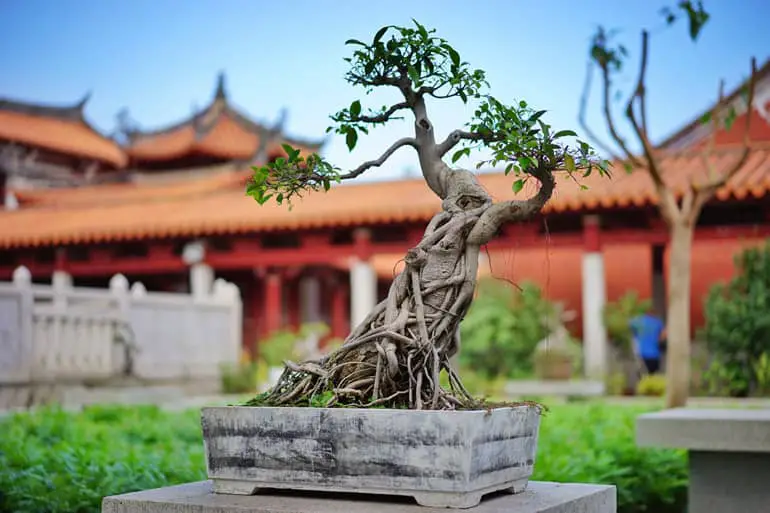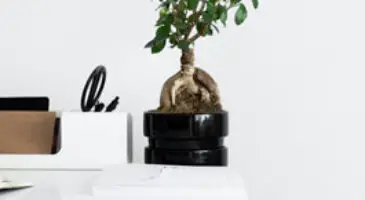Table of Contents
Considering the attention the practice of Bonsai is getting throughout the world in recent times, it would be hard for one to believe that this was something that started in China some hundred years ago with only the elite of the society during that time practicing the culture.
In fact, it would be difficult for people who witnessed the early stage of the practice to believe it would be a worldwide phenomenon today.Nowadays, you will see Bonsai carefully placed on shelves in schools, homes, offices, waiting rooms, bedrooms, and so on.
This Chinese initiative has almost become a part of our daily lives, and the rising popularity of the culture often causes people to wonder, why does everyone love Bonsai? I know the answer to this question is not so complicated, but this article takes a deeper look into the possible reasons.
Why everyone love Bonsai?

People love Bonsai for two major reasons:
- Bonsai trees are attractive and would make a pleasant decoration.
- The thought of growing a big tree in a small container is intriguing, and people love intrigues.
Aside from those two obvious reasons, people also love Bonsai because of the benefit of training one. Check below for details.
1. It teaches art
Bonsai on its own is an art. Art here does not mean drawing on walls or paper. But the art of creating something brings about life. Bonsai teaches people to grow, form, and cultivate a living thing.
2. It teaches patience
Since it takes time to train a mature Bonsai tree successfully, training a Bonsai up to this stage requires patience and dedication. If, as a grower, you can nurse a Bonsai tree to maturity, you are just a few steps away from mastering the art of patience.
3. It is gratifying
Although most growers don’t cultivate Bonsai for monetary benefit, the practice is sure rewarding. It is gratifying. Like I said earlier, Bonsai takes years of attention to reach maturity, and the feeling of fulfilment, accomplishment, and satisfaction comes with this.
4. It can serve as a legacy
Bonsai trees can live for over a hundred years, which means they might outlive their owner. Should this happen, the owner’s children or family can take up the responsibility of taking care of the tree.
5. It is a nice hobby
Raising a Bonsai tree comes with the responsibility of feeding, watering, pruning, potting, and many other things. So for someone with plenty of time, all these activities will make up for your pastimes.
Why Bonsai is Bad
Despite the many benefits Bonsai trees offer, some still believe they are a threat. Here are some of the reasons they believe Bonsai is bad.
- Bonsai tradition is plant cruelty because plants are given less attention than they would get if they were in the wild.
- Bonsai trees attract insects, and this may lead to insect infestations in homes.
- Bonsai trees house microscopic toxic spores capable of causing health problems.
- Some Bonsai trees are toxic to pets.
Does Bonsai hurt the tree?
No, Bonsai does not hurt trees. The essence of Bonsai may be to keep trees small, but that does not mean you are hurting them.
Bonsai trees may not have the same height or spread as the same species planted on a landscape, but they are adequately cared for by providing them with the amount of water, fertilizer, sunlight, temperature, etc., they need to survive.
This does not describe the word ” hurt”, except there are other meanings recently ascribed to it.
What’s so special about Bonsai trees?
Firstly, the fact that they are kept small is marvelling and makes them special. Beyond that, Bonsai trees are said to be able to bring life energy into indoor spaces, and this can be felt even by passersby. Also, Bonsai trees are believed to send joy and contentment to whoever admires them.
What does it mean to gift a Bonsai?
If you give Bonsai out to someone as a gift, it means the fortune of the recipient has doubled. This is because it is believed that Bonsai trees can invite patience, positivity, care, nurturing, peace and harmony into the life of whoever owns them.
How do I know if my Bonsai tree is healthy?
- The branches of a healthy Bonsai tree will be uniformly spread across the whole tree, and the roots will not cross one another.
- It must have surface roots that spread across all directions, and the root must be firmly attached to the pot.
- The trunk of the tree must be sturdy and have a smooth surface. Also, the base of the trunk must be thicker and becomes thinner all through to the top.
- Green lush leaves indicate a healthy tree; therefore, your Bonsai tree must also be richly green.
What Bonsai symbolizes
Every Bonsai tree is significant, and many of them have a particular meaning they symbolize. However, Bonsai trees generally symbolize order of thought, peace, harmony, and balance.
Is Bonsai a symbol of love?
Yes, Bonsai can be used as a symbol of love. You can gift a newly wedded lover of the Bonsai tree a Fiscus Bonsai tree as it signifies love, fertility, and good health. This particular one is one of the easiest to grow indoors, and it can survive low light and humidity.
Are Bonsai good luck?
Yes, Bonsai brings good luck.
Different bonsai trees convey different meanings; one of the implied meanings of Bonsai is that they bring fortune and good luck to their owner.
Is Bonsai a good gift?
Yes, Bonsai is a good gift. Apart from the wonderful symbolism of Bonsai trees, gifting someone in a confined or restricted area with no view of nature will bring the energy and feeling of the outside world to such a person. Bonsai will also make an excellent gift choice for an older person longing to care for something.
What plants are unlucky for home?
In as much as there are good trees that bring about fortune in the house, there are also trees that can bring bad luck. Some of these trees include,
- Cuctus plant
- Philodendron
- Lilies
- Oleander Nerium Oleander
- English Ivy
- Myrtle
- Cotton
- Babul
- Tamarind
- Banyan tree



